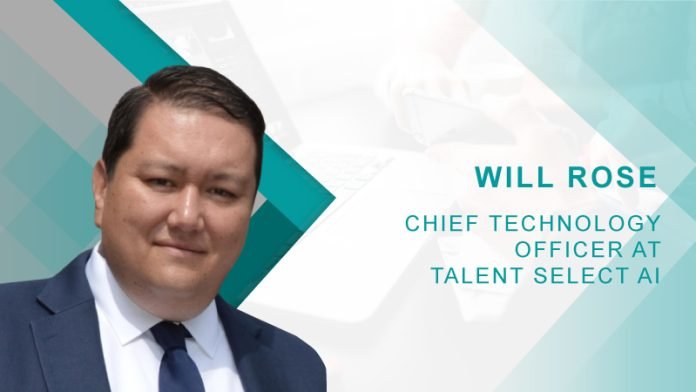Can you tell us about your role as the Chief Technology Officer at Talent Select AI and your primary responsibilities in leveraging technology for HR solutions?
As Chief Technology Officer at Talent Select AI, I oversee product development and data science operations for the company. The organization has a long history as a video interview software company and, in more recent years, we have been primarily focused on building AI tools to help employers get the most out of the hiring process – specifically in the area of job interviews. As of today, our core technology analyzes job interviews to provide psychometric assessments about job candidates. This includes measuring personality traits and skills that are predictive of job performance.
AI technologies are becoming increasingly prevalent in the hiring process. How do you see employers leveraging AI in recruitment and selection, and what benefits does it offer to both employers and job seekers?
AI technologies have already found their way into just about every aspect of the hiring process. This includes tools that help recruiters source and identify potential talent, technologies that analyze resumes to identify qualified candidates, and chatbots that assist candidates through the hiring process. Talent Select AI is focused on the talent selection step, and helping hiring managers identify the best-fit candidates from their applicant pools. The primary benefit of using these emerging tools is efficiency, especially for employers that do a lot of hiring.
As we all know, the hiring process is a costly, time-consuming task. Recruiters often work long hours and, unfortunately, spend a lot of time on tedious work – work that could be streamlined with AI and other advanced automation tools.
As an example, many large employers ask candidates to complete one or more assessments during the selection process. This inserts an additional step in the process that is often a stressful experience for candidates. Personally, I remember having to go through a 45-minute personality test for my first job out of college at a large telecom company. The experience was stressful, and I was primarily concerned with answering correctly – meaning I was answering the assessment questions based on what I thought the employer was looking for, instead of honestly – which defeats the purpose and goal of a personality assessment. So, not only was the candidate experience a poor one for me, but the reliability of my results was questionable. AI tools offered by Talent Select AI, for example, not only help streamline the assessment step in the hiring process but offers a more reliable measurement of candidates versus traditional psychometric evaluations. By leveraging AI to perform the psychometric assessment during the job interview, employers can do away with their traditional assessment step altogether. That’s a better experience for the candidate and simplifies the entire selection process for the employer.
As the Chief Technology Officer, how do you foster a culture of innovation and technical excellence within the technology team at Talent Select AI?
At Talent Select AI, we pride ourselves on being a science-driven organization. This is to say, we prioritize scientific validity over technology innovation. For example, our product and technology teams meet weekly with our team of scientific advisors, which include leading Ph.D. researchers and experts in the fields of industrial/organizational (IO) psychology and social psychology. This has had a direct impact on how we approach our AI development, such as our commitment to building AI technology that is inherently explainable. Some of today’s headline-grabbing AI technology is not explainable in nature – meaning even the developers of the AI tools are not able to explain how their AI makes its predictions or determinations. This is a problem and a concern when applying these advanced tools to the hiring process, which can impact peoples’ livelihoods and opportunities.
How does Talent Select AI maintain a competitive edge in the HR technology market? Can you share any upcoming innovations or developments that the company is working on?
To stay competitive, Talent Select AI has made its technology available in different forms to make it easier for organizations to utilize our assessment tools. We initially launched our AI technology as an API product that could be integrated into other existing tools, such video conferencing services or existing video interviewing products on the market. We are also launching, within the next thirty days, our own video interview product for organizations that do not wish to integrate the technology with an existing platform.
How does Talent Select AI ensure that its non-invasive assessments are aligned with the specific job requirements and organizational culture of client companies? How customizable is the assessment process?
We work with our clients and end users to ensure our assessments are utilized in the most optimal way. This includes understanding the job types our tool will be used for and understanding the traits and skills that are most relevant to those job types. Our tool can be leveraged in a way that is unique to every customer.
Can you discuss any potential challenges or limitations of AI technologies in the hiring process? How can these challenges be addressed to ensure a fair and effective recruitment process?
The primary challenge of any AI technology used in the hiring process is ensuring the tool is fair and does not produce biased results. This, again, is why AI in hiring needs to go beyond just innovation. Employers need to ensure they are selecting tools that have been validated and shown to produce unbiased results. And that verification must be ongoing as well, which should include regular bias audits.
Finally, what precautions or ethical considerations should employers keep in mind when using AI technologies in the hiring process? How can they ensure transparency and accountability throughout the process?
It is important that employers rigorously vet any AI tool they introduce into their hiring process. There are well-known examples from the past that should serve as a warning to employers that technology within the talent acquisition space needs to go beyond just innovation. A famous example is a resume analysis tool developed by Amazon in 2017 that ultimately taught itself to be biased against women applicants.
These types of tools need to be well-validated, backed by scientific research, and proven to be bias-free.
Questions that should be asked during the technology evaluation process should include the following: 1) What is the validity of the tool and what evidence does the vendor have to prove it? 2) Who performed the validation of the tool (was it done internally or by a qualified third party)? 3) How has the tool been tested for bias and what were the results?
How do you foresee HR technology evolving in the coming years? Are there any emerging technologies or trends that you believe will significantly shape and revolutionize the HR landscape?
I think we will see even more automation in HR-related activities, to the point where we will see a real shift in the daily function of HR professionals, and very much in a positive way. Gone will be much of the tedious, repetitive tasks to the benefit of more real human interaction with workers. And while some of the emerging technologies, like one-way recorded interviews, might be jarring for those who are not yet used to the experience, I do see significant improvements coming for the overall candidate experience. The hiring process shouldn’t be a dreadful one for either talent acquisition workers or candidates, and emerging tools will ultimately help.
Please share with us your source of inspiration for venturing into the talent management niche.
I have a deep appreciation for HR professionals and the work they do – and they are certainly one of the most underappreciated groups of people in the workplace. Developing tools that help talent management professionals spend more time on the important things, like solving problems and building relationships with candidates, is a real driver for us.
Explore HRtech News for the latest Tech Trends in Human Resources Technology.
Want to Contribute? CLICK HERE To Submit Your Guest Post and Join Our Community of Writers!!!

Will Rose Chief Technology Officer at Talent Select AI
William Alfred Rose is the Chief Technology Officer at Talent Select AI, joining the company in January 2020. Mr. Rose oversees product development and is a co-inventor of the company’s patent-pending AI technology, a validated job interview analysis platform that provides psychometric insights about job candidates. He previously held various senior leadership positions at NewtekOne (NASDAQ: NEWT).












